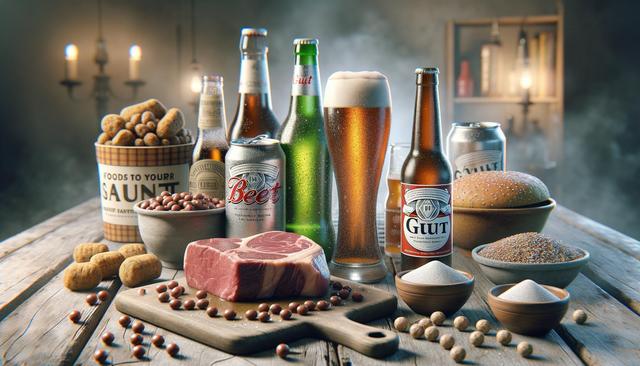Foods and Drinks to Avoid for Better Gout Management
To manage gout, avoid foods like red meat, seafood, and alcohol. Drink plenty of water daily to flush out uric acid. Use methods like rest, ice packs, and meds to relieve pain and reduce inflammation for better health.

Understanding Gout and Dietary Triggers
Gout is a form of arthritis caused by the buildup of uric acid crystals in the joints, leading to sudden and severe pain, swelling, and stiffness. Uric acid is produced when the body breaks down purines, which are naturally found in many foods. When uric acid levels become too high, either due to overproduction or under-excretion, gout attacks can occur. For individuals managing this condition, understanding the role of diet is crucial. Certain foods and drinks are known to contribute to increased uric acid levels and should be limited or avoided to reduce the frequency and severity of flare-ups.
Not everyone with high uric acid develops gout, but for those who do, dietary habits can make a significant difference. By identifying and avoiding specific triggers, individuals can take a proactive role in managing their symptoms and improving overall joint health. Paying attention to what you eat and drink can help prevent future attacks and reduce dependency on medication.
High-Purine Foods to Avoid
Purines are natural substances found in many foods, and while the body needs a certain amount, excessive intake can lead to high uric acid levels. Foods especially high in purines should be avoided by those managing gout. These include:
- Red meats such as beef, lamb, and pork
- Organ meats like liver, kidneys, and sweetbreads
- Shellfish and oily fish including sardines, anchovies, and mackerel
- Certain types of game meat
These foods can significantly raise uric acid levels and increase the risk of gout attacks. Instead, individuals are encouraged to choose plant-based proteins and lean animal protein sources such as poultry and low-fat dairy. Cooking methods also matter—grilling, baking, or steaming are preferable to frying, which can add unhealthy fats that may exacerbate inflammation.
Alcohol and Sugary Beverages
Alcohol consumption is a well-known risk factor for gout, particularly beer and spirits. These drinks not only contain purines but also interfere with the body’s ability to eliminate uric acid. Beer, in particular, contains a high amount of purines from brewer’s yeast. Even moderate alcohol consumption can trigger a gout flare in susceptible individuals.
In addition to alcohol, sugary beverages like soft drinks and fruit juices with added sugars should be limited. These drinks often contain fructose, a type of sugar that can increase uric acid production. Regular consumption of these beverages has been associated with a higher incidence of gout, especially in people who are overweight or have metabolic issues.
To stay hydrated and support kidney function, water is the best choice. Aim to drink at least 8–10 glasses of water per day, especially during warmer months or periods of physical activity. Herbal teas and unsweetened beverages can also be good alternatives.
Processed and Refined Foods
Processed foods often contain ingredients that contribute to inflammation and uric acid buildup. These include refined carbohydrates, trans fats, and excessive sodium. Common culprits include:
- White bread, pastries, and sugary cereals
- Packaged snacks like chips and crackers
- Frozen meals and canned soups high in sodium
- Fast foods and deep-fried items
These foods not only lack nutritional value but also contribute to weight gain and metabolic disorders, which can worsen gout symptoms. A diet rich in whole grains, fresh vegetables, and fiber helps support healthy digestion and uric acid elimination. Replacing processed snacks with fruits, nuts, and seeds can also reduce inflammation and promote overall wellness.
Reading food labels carefully and preparing meals at home can help individuals make better choices. Cooking from scratch allows for control over ingredients and can significantly reduce the intake of harmful additives that may trigger gout.
Healthier Alternatives and Lifestyle Tips
Managing gout is not only about avoiding certain foods but also about choosing healthier alternatives that support joint health and reduce inflammation. Some positive dietary choices include:
- Low-fat dairy products such as yogurt and skim milk
- Whole grains like oats, barley, and brown rice
- Cherries and berries, which may help lower uric acid
- Leafy greens and non-starchy vegetables
In addition to diet, maintaining a healthy weight through regular physical activity can reduce the strain on joints and lower uric acid levels. Avoiding crash diets and staying consistent with balanced meals is important for managing this condition long-term.
It is also recommended to monitor uric acid levels regularly and consult a healthcare provider for personalized dietary advice. Medications may be necessary in some cases, but lifestyle changes can significantly reduce the need for them and improve quality of life.
Conclusion: Making Informed Choices for Gout Management
For individuals living with gout, understanding which foods and drinks to avoid can make a meaningful difference in managing symptoms and preventing flare-ups. By reducing intake of high-purine foods, limiting alcohol and sugary beverages, and steering clear of processed items, it’s possible to control uric acid levels more effectively. Incorporating healthier alternatives, staying hydrated, and maintaining a balanced lifestyle further supports joint health and overall well-being. Making informed, consistent dietary choices is a powerful step toward better managing gout and improving daily comfort.